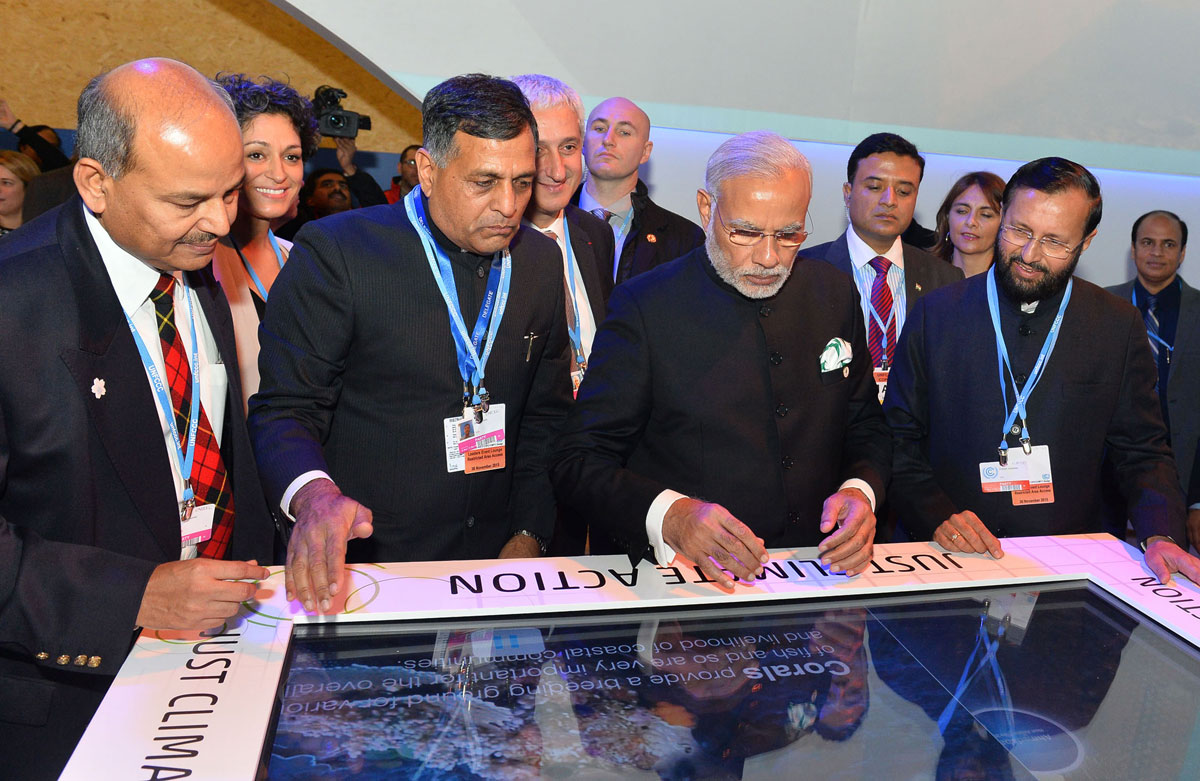RICH-POOR DIVIDE
Prime Minister Narendra Modi visiting the India Pavilion, at COP21 Summit, in Paris, Nov. 30. Minister of State for Environment, Forest and Climate Change (Independent Charge), Prakash Javadekar, and the Secretary, Ministry of Environment, Forest and Climate Change, Ashok Lavasa, are also seen. (Press Information Bureau)
The rich-poor divide dominated climate talks today with BASIC countries, including India, asking developed nations to define a clear roadmap for providing $100 billion by 2020 to tackle climate change and green groups calling for high emitters to be held accountable, writes Tuhin Dutta. (#ClimateChange, #environment, #siliconeer, @siliconeer, #CoP21Paris)
A statement issued by China in the climate summit plenary on behalf of BASIC countries, a bloc of four large newly industrialized countries—Brazil, South Africa, India and China, extended support for a transparent and party driven process at the 12-day conference.
The statement said that BASIC will work pragmatically with all other parties for an equitable and balanced climate agreement.
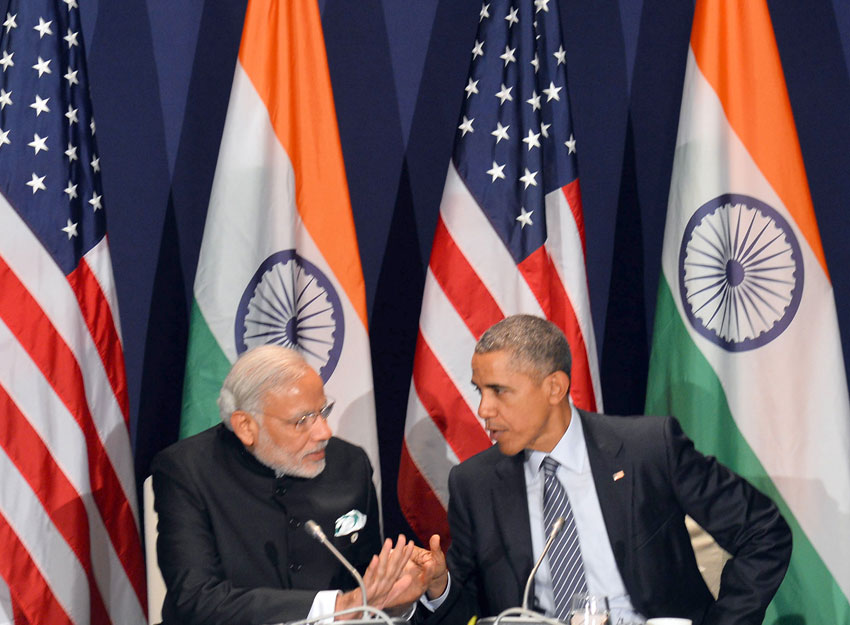
It said that the agreement should be as per all the principles and provisions of the UN Framework Convention on Climate Change (UNFCCC) especially equity and common but differentiated responsibilities (CBDR). It asserted that differentiation should be there in each element of the Paris agreement.
Noting that there is a gap in support provided to developing nations, the BASIC countries said the second commitment period of Kyoto Protocol is an important step and instrument to implement the convention ahead of the agreement.
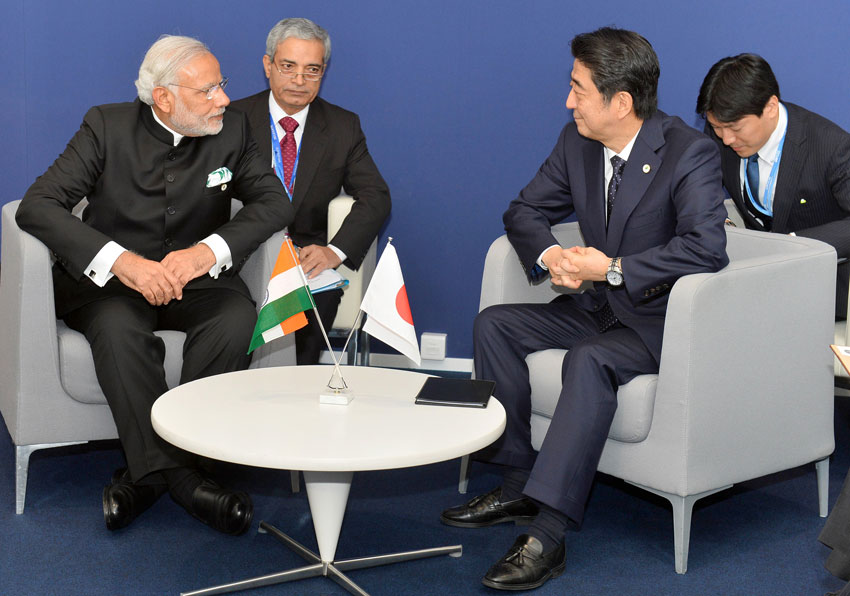
Developed nations should honor their commitments, made at the Copenhagen climate change conference in 2009, to provide $100 billion annually by 2020 and ensure that there will be no funding gaps from 2013 to 2020, it said.
Developed nations should also fulfill their pledge to offer $30 billion in “fast-start funding” to developing nations in order to help them address climate change, the statement said.
The BASIC countries committed to act jointly at the Copenhagen summit, including a possible united walkout if their common minimum position was not met by the developed nations.
The Paris 2020 negotiations should have all aspects of the Kyoto Protocol and adhere to differentiation of the developed and the developing countries, the statement said.
British charity Oxfam issued a study saying the poorest half of the world’s population — 3.5 billion people—is responsible for just 10% of carbon emissions, despite being the most threatened by the catastrophic storms, droughts and other severe weather shocks linked to climate change.
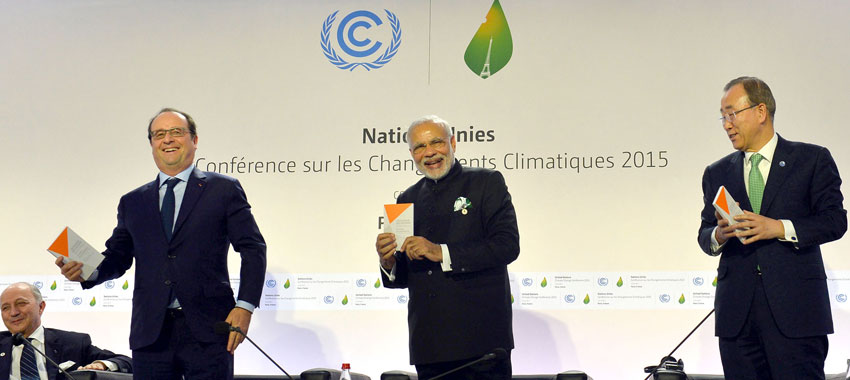
“Rich, high emitters should be held accountable for their emissions, no matter where they live,” Oxfam climate policy head Tim Gore said on the second day of the climate talks.
“But it’s easy to forget that rapidly developing economies are also home to the majority of the world’s very poorest people and while they have to do their fair share, it is rich countries that should still lead the way,” he said in a statement.
“Paris must be the start of building a more human economy for all – not just for the ‘haves,’ the richest and highest emitters, but also the ‘have-nots,’ the poorest people who are the least responsible for and most vulnerable to climate change,” he added.
Developing countries say the West has polluted for much longer and should shoulder a bigger obligation.
The previous climate treaty, the 1997 Kyoto Protocol, divided the world into developed and developing countries and only required the former to cut their greenhouse gas emissions.
The U.S., the European Union and other developed countries say this time all countries must chip in and that the rich-poor firewall is outdated anyway since it classifies countries like Qatar, the wealthiest country on earth per capita, as developing.
India and many others want the Paris agreement to state clearly that the developed countries have a bigger responsibility to fight global warming.
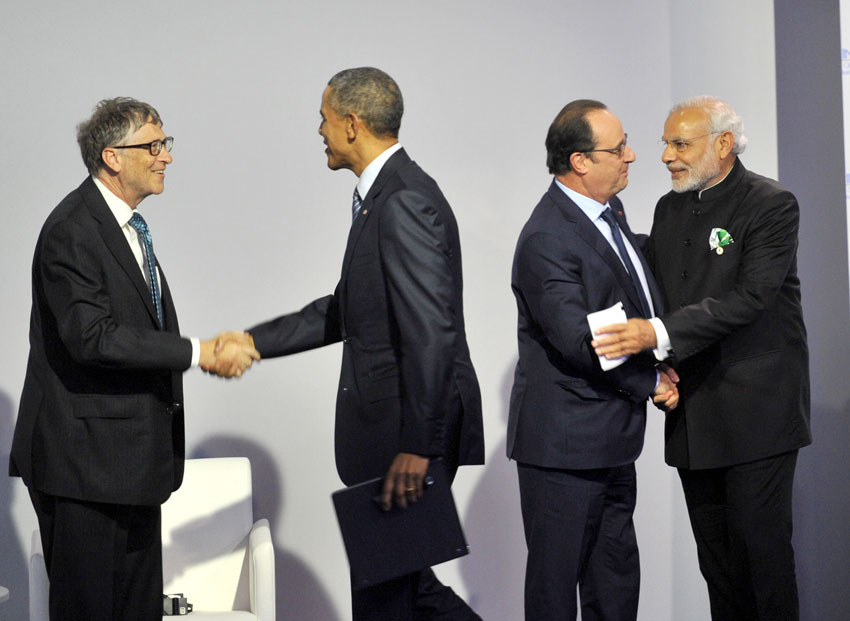
Ajay Mathur, one of the top Indian negotiators at the Conference of Parties (CoP21), said India remains committed to working with all parties for a “just and sustainable” deal.
He asserted that India wanted developed nations to commit to more progressive targets on emission reductions.
Prime Minister Narendra Modi has cautioned against any unilateral steps that will lead to an economic barrier in the battle against climate change. He hoped the developed countries would mobilize $100 billion annually by 2020 for mitigation and adaptation.
“The principles of equity and common but differentiated responsibilities must remain the bedrock of our collective enterprise,” Modi said.
The negotiators from 195 countries are working off a document that is more than 50 pages long. They will attempt to whittle the text down to half that length by Dec. 5, a deadline set by French Foreign Minister Laurent Fabius.
In the following week, countries will send higher-level negotiators to the meetings in Paris, where they will hone in on the core issues and attempt to come up with a lasting political agreement.
Developing countries need money and technology to make the switch to clean energy sources like solar and wind power.
They are also asking for money to adapt to climate change. The developed countries are willing to help but reluctant to make firm commitments.
The 12-day conference will, for the first time in over 20 years of UN negotiations, aim to achieve a legally binding and universal agreement on climate, with the aim of keeping global warming below 2°C over pre-industrial temperatures.
President Barack Obama has said that parts of the global warming deal should be legally binding on the countries that sign on. But international treaty imposing emissions limits on the U.S. is not likely to be approved by the Republican-controlled Congress.
